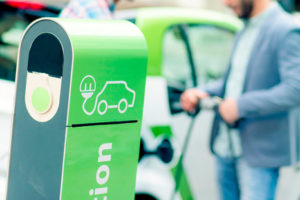TOWARDS LOW AND ZERO EMISSION VEHICLES IN EUROPE
CLEAN VEHICLES AND A LOW CARBON ECONOMY
Now that the international climate change talks have finished, with some issues relating to the implementation of the Paris Agreement having been resolved, policy attention turns back to the EU level. On 8th November 2017, the European Commission published its ‘Clean Mobility’ package, which contained important proposals that will contribute to reducing carbon dioxide (CO2), as well as air pollutant emissions, from transport.
This is the latest in a series of major transport policy announcements from the Commission, following May 2017’s ‘Europe on the Move’ package, and which will be followed in 2018 with the publication of proposals to reduce CO2 emissions from trucks.
Transport’s emissions are still a problem
Until the financial crisis of the late 2000s, the EU’s transport’s CO2 emissions had been steadily increasing as demand for mobility grew. In the years after the crisis, transport’s CO2 emissions declined – until 2014, when they started to increase once more. In 2016, the European Commission’s Strategy for Low Emission Mobility reaffirmed the objective of reducing CO2 emissions from transport by at least 60% by 2050, compared to 1990 levels. This, along with the fact that many towns and cities in the EU are facing dangerous levels of air pollution resulting largely from road transport, underlines the importance of improving the environmental performance of new vehicles sold in the EU.
Clean Mobility Package
The Commission’s ‘Clean Mobility’ package contained a number of proposals, of which two were particularly important for developing the market for cleaner vehicles in the EU. The first was the Commission’s proposal for the next phase of the Passenger Car CO2 Regulation, which requires manufacturers to reduce the amount of CO2 emitted from new cars. The Commission has proposed that manufacturers will have to improve the fuel efficiency and reduce the CO2 emissions of new cars and vans by 30% between 2020 and 2030.
The second proposal of relevance was the Commission’s proposal to amend the Clean Vehicle Directive. This requires public authorities to take account of the environmental performance of vehicles when buying new cars, buses and trucks. It proposes a simple definition of a ‘clean vehicle’, along with targets for Member States to ensure that such vehicles are purchased. This should help to stimulate the market for clean vehicles.
The economic opportunity of the transition to low and zero emission vehicles
Although delivering sustainable mobility is a global challenge, Europe must be amongst the frontrunners and recognise the opportunities for jobs, growth and investment for EU industry that will result from the transition to a low carbon economy. After all, as noted by the Commission, the car was invented in Europe, so Europe must be at the forefront of reinventing it.
In the upcoming decades, the European car industry will need to innovate and continue to develop and embrace new technologies to accelerate the transition away from the internal combustion engine. The new proposals will contribute to this. The Commission has estimated that net employment in the EU could grow by up to 70,000 jobs in 2030, as a result of such policies.
Improving the quality of life and health of citizens
There should be many benefits for citizens of such policies, not least as a result of lower CO2 emissions, improved air quality and quieter vehicles. In turn, these should provide benefits in terms of improved health. The proposed new CO2 standards for cars will also make cars cheaper to run, with the Commission estimating that a typical car owner would save up to €1,500 as a result of the fuel savings arising from driving a more efficient vehicle.
TEPR supported the European Commission in the development of studies in support of both the proposed revision of the Passenger Car CO2 Regulation and the Clean Vehicle Directive. Both of these reports will eventually be available on the ‘CO2 emissions from cars‘ and ‘Green procurement‘ pages of TEPR’s website.
TEPR is an independent research consultancy working for the implementation of sustainable, low carbon transport solutions in the UK and within the EU. Call today on +44 (0)7521 063324.


Leave a Reply
Want to join the discussion?Feel free to contribute!